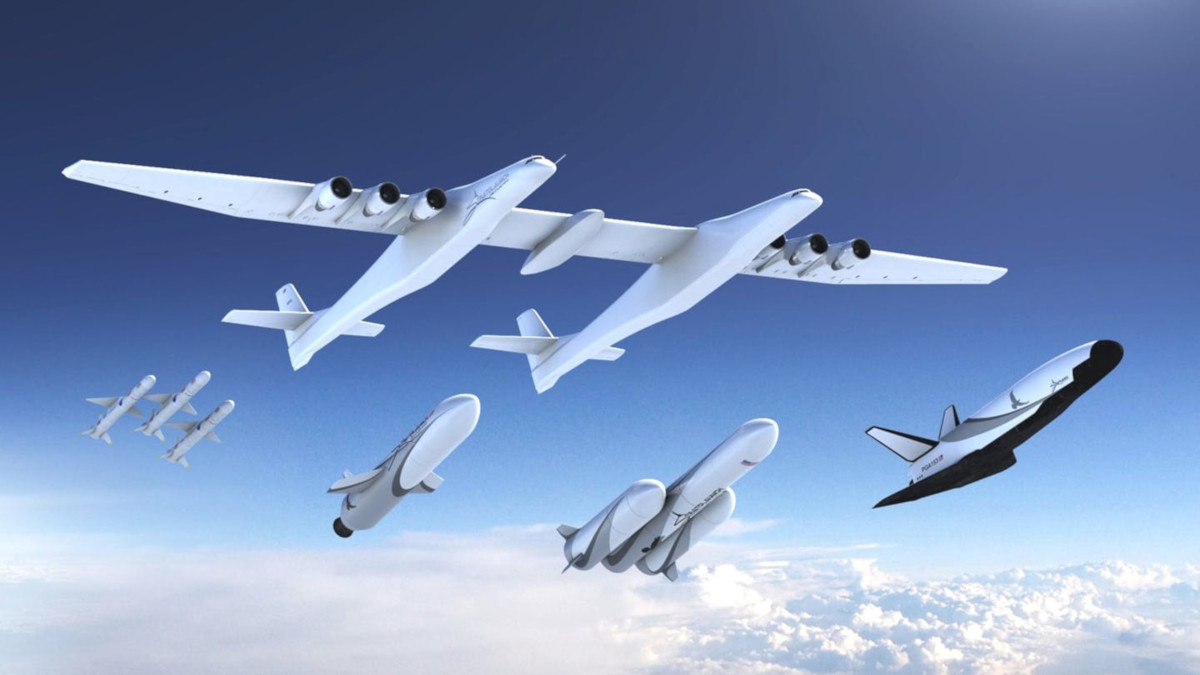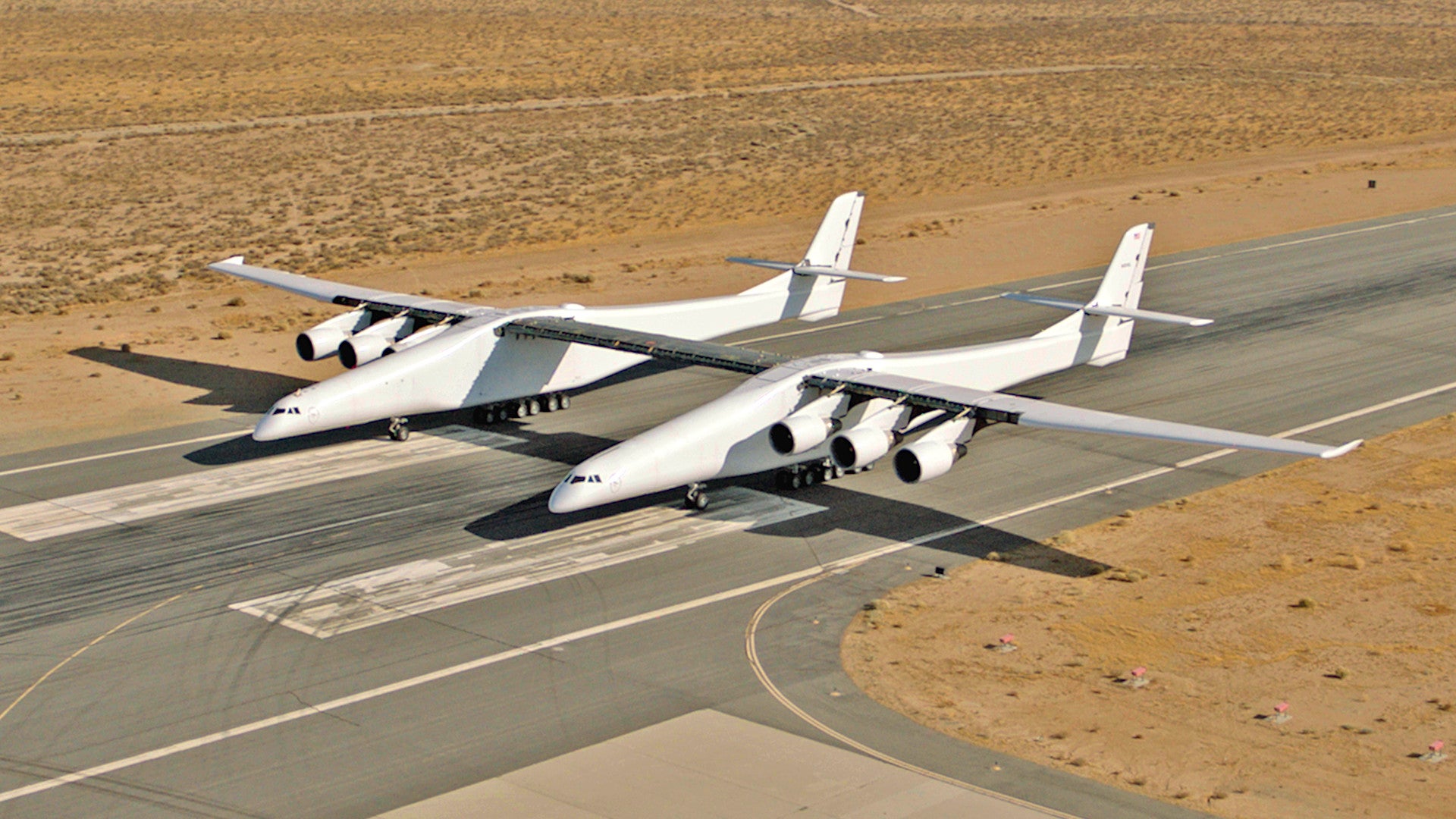Space launch company Stratolaunch, which the late Microsoft co-founder Paul Allen had founded nearly a decade ago, is reportedly in the process of closing down for good and will be selling off all of its physical assets and intellectual property rights. The news comes less than two months after the firm’s massive Roc aircraft, the largest plane ever flown, took the sky for the first time.
On May 31, 2019, Reuters reported that Vulcan, Inc., an investment firm that Allen had also established to support Stratolaunch and many other projects, had decided to shutter the space launch unit, citing multiple unnamed individuals familiar with the plans. The War Zone also heard this earlier in the week. Allen died in October 2018 after a battle with cancer.
Founded in 2011, Stratolaunch hoped to offer low-cost and flexible access to space, using the Roc aircraft, named after the mythical bird of prey capable of carrying off an elephant, to air-launch expendable and reusable space launch vehicles. A cost-effective air-launched space access concept would allow customers to get payloads into space on shorter notice than with traditional rockets and launch them from the best possible location, a potential game-changing capability that you can read about more here.
Scaled Composites, a part of Northrop Grumman, had actually designed and built the aircraft. The plan had been for Roc to conduct its first test launch of a Pegasus XL space launch rocket, another Northrop Grumman product, in 2020. Stratolaunch and Northrop Grumman both declined to give comments to Reuters for its story and it is unclear whether or not the test program will continue under the latter company’s direction, but it seems unlikely at this point.

There had already been serious questions about Stratolaunch’s future after Allen’s death. In January 2019, the company publicly announced that it was canceling work on a family of space launch vehicles, including a reusable space plane known as Black Ice, as well as new rocket motors to power them.
“Stratolaunch is ending the development of their family of launch vehicles and rocket engine,” the firm said in a statement at the time. “We are streamlining operations, focusing on the aircraft and our ability to support a demonstration launch of the Northrop Grumman Pegasus XL air-launch vehicle.”

One of Reuters‘ sources said that Stratolaunch was already working with a skeleton staff of only 21 people by April 1, 2019, down from nearly 80 just four months earlier. These individuals reportedly were focused on supporting the Roc’s first flight. Another source told Reuters that Judy Allen, chair of Vulcan, a trustee of the Paul G. Allen Trust, and Paul Allen’s sister, had let the flight occur to honor her late brother’s wishes, but had already decided to close down Stratolaunch afterward by that point.
It’s unclear what may have led to Stratolaunch’s demise. Dramatic drops in the cost of launching payloads into space, driven in no small part of by space launch firm SpaceX’s pioneering work on its Falcon series of reusable booster rockets, had also called into question how cost competitive the air-launched option might be in the end. Development and construction of the Roc alone had cost at least $200 million.

By 2018, SpaceX was offering to loft payloads up to 50,000 pounds into low earth orbit at prices starting around $50 million. Three years earlier, NASA had spent $56 million to use a different launch aircraft to boost a payload into orbit on board a Pegasus XL, which has a maximum payload capacity of less than 1,000 pounds. It is worth noting that this contract included “firm-fixed launch service costs, spacecraft processing, payload integration, tracking, data and telemetry and other launch support requirements,” according to official reports.
Of course, Stratolaunch wasn’t targeting the same exact same part of the market as traditional launch firms, such as SpaceX, either. Virgin Orbit is still aiming to offer similar aerial space launch services in the near future.

If it looks like Stratolaunch’s concept, centered around the Roc, can deliver competitive pricing along with greater flexibility, this might point to a future for the company’s physical assets and intellectual property, all of which will reportedly now be up for sale. Much of the Roc’s initial development costs are paid for and the aircraft has already flown, though we don’t know how much more it needs to get to a launch.
As noted, Northrop Grumman, a major contractor to the U.S. government, might have an interest in acquiring the remnants of Paul Allen’s ambitious space project for its own use. Other space launch firms, including Virgin Orbit, might have an interest in picking up where Stratolaunch left off, as well. Some have wondered whether it might be possible to covert the Roc to other uses, including as a carrier for modular cargo pods.
The U.S. military or another government entity could seek to buy the plane and design rights to the rest of Stratolaunch’s developments and continue that work internally, too. The United States, in particular, has a long-standing interest in aerial space launch concepts, which you can read about more here and here.
We will have to wait and see what happens next, but it would be a sad end to Paul Allen’s space dreams if the Roc were to end up grounded for good.
Contact the author: jtrevithickpr@gmail.com
